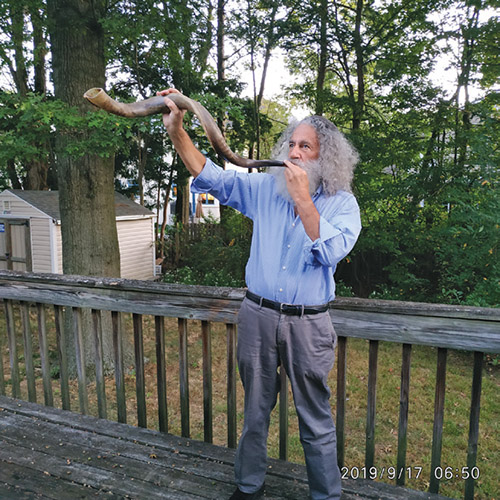

Teaneck’s got a new town crier and Lenny Fuld is his name. Fuld, a longtime resident who is well known for his friendly demeanor, roaring motorcycle and trademark moustache, has been an active member of the community for 40 years. In recent weeks, he has assumed the role of community shofar blower, sounding blasts on Friday afternoon to alert the neighborhood of the incoming Shabbat.
Fuld, a tax professor and director of the graduate tax program at Yeshiva University’s Sy Syms School of Business, became interested in the concept of shofar blowing years ago after visiting his great-grandparent’s graves on a trip to Germany with his wife, Mushy. During that visit, Fuld noticed an image of a shofar engraved on his great-grandfather’s tombstone. Upon returning home, he spoke with his father who explained that his grandfather had been the town shofar blower. Intrigued, Fuld began to research the techniques and rules surrounding this custom.
The Gemara in Masechet Shabbat (35b) describes a tradition that was observed each week before Shabbat in Jewish communities during Talmudic times. A person would climb onto a roof and blow six shofar blasts, a series of teki’a-teru’a-teki’a twice. Each blast carried a specific significance. The first was to alert the farmers working in the fields outside the city that it was time to put down their tools in preparation for Shabbat, the second alerted the shopkeepers in the city to close their stores and the third blast indicated the time to light the Shabbat candles.
In earlier generations, erev Shabbat wasn’t just a regular weekday. Rather, it was designated as a time to prepare for the impending Shabbat. Similarly, motzei Shabbat was not just a Saturday night––it was a time for a melava malka. As many probably know, sounding a siren is customary on erev Shabbat in many neighborhoods throughout Yerushalayim, where part of the observance of Shabbat is considered to be the preparation that takes place on Friday afternoon.
Today, where we live in communities that are not under our own sovereignty, sounding the shofar can be more complex. Nonetheless, having learned and taken a liking to the idea of announcing the Shabbat, Fuld decided to start blowing the shofar on his deck in Teaneck on Friday afternoon. Recently he was approached by some neighbors who knew he was blowing the shofar yet could not clearly identify the sounds. This prompted Fuld to put out a request for an amplifier, which Teaneck residents Ari Wartelsky and Phil Goldschmiedt generously provided.
“Now I can certainly get the Shabbos shofar alert out to a wider audience,” Fuld said. This past Shabbat, Goldschmiedt, who lives a good two blocks from Fuld, confirmed that he was in fact able to hear the blasts loud and clear.
Over the past many years, Fuld has cultivated his shofar blowing skills, whether it be during Elul each morning at his local minyan in shul, or when visiting individual homes on Rosh Hashana to sound the shofar for those who could not attend shul for health reasons. He also spends Shabbat in July at Camp Moshava Indian Orchard where his wife and daughter work, and has started to blow shofar as part of the closing ceremony of the mifkad (a pre-Shabbat assembly).
“In Psalms/Tehillim 47:6 it states that God was uplifted by the sounding of the shofar,” Fuld said. “Accordingly, I can’t help but think that us mortals hearing the shofar should raise our spirits and religious awareness, if only just for those few moments and the more people that hear it the better. Plus, I always get the feeling that it brings a certain sense of joy to my great-grandfather.”
Fuld hopes members of the community will see this custom as an expression of honor and respect for Shabbat. So this Friday, if you hear a loud sound, it’s not a plane or a train, it’s just Lenny Fuld and his teki’a reminding you that Shabbat is on its way.










